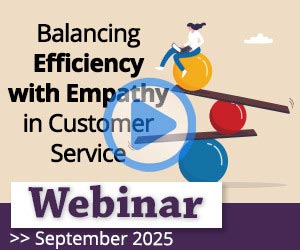When it comes to providing the best customer service, there are certain skills that everyone staffing your contact centre should possess.
The following may seem basic for many, but it is surprising to me how many times these basic skills are overlooked.
More often than not, it is the people themselves who make the difference when it comes to an organisation’s ability to provide great customer service.
Here’s a list of 10 customer service skills that every person involved in customer service needs to own to be able to provide the best customer experience possible. Let’s take a look:
1. Effective Listening
The foundation for providing great service is, first of all, the ability to simply listen to what a customer is saying.
Customers are already often frustrated about something when they call, and nothing compounds that frustration more than to feel misunderstood and misinterpreted.
Listening isn’t just about hearing what is being said, but also understanding what is not being explicitly said in order to offer the best solution.
2. Empathy
Empathy is essentially the ability to see and feel the world through the eyes of another by experiencing their emotions.
In customer service, empathy means the ability to identify with and, hence, validate the customer’s problem, and this consideration and respect for the customer goes a long way in giving the customer a sense of trust in the process.
So, put aside your own viewpoint, and try and see things from the customer’s point of view.
3. Self-Control
Maintaining a sense of empathy will also help in maintaining one’s self-control, and that’s important because customer service reps are sometimes going to be the primary target of customer frustration.
However, at the same time, it requires the skill to listen to emotion without emotion, to always be aware that the customer’s anger is not directed at you personally, even if their language is, and to stay calm and under control at all times to defuse these situations.
4. Clear Communication
If you are not a great communicator, you will probably not make it in customer service for very long.
The ability to communicate clearly and effectively verbally (and in writing) is essential. This means getting to the problem at hand quickly and keeping the small talk to a minimum.
In other words, finding the balance between being friendly and conversational and giving the right answers in a removed, professional style.
Clarity isn’t just important for making your customer feel good and secure; it can also have a big effect on your bottom line.
5. Positive Language
Language is a powerful tool and the way you use it will determine whether your words are received positively or negatively. Especially in the realm of customer service, small shifts in the way reps communicate by using only positive language can reap tremendous benefits.
Being optimistic can help a customer stay positive, too. Simply using positive language that reflects confidence in finding a solution will reassure a customer and improve the entire customer experience.
6. Persuasive Speaking
While speaking clearly and positively are both essential aspects of effective communication, it doesn’t end there. Keeping your customers at the centre through active persuasive speaking skills can dramatically help your customer interactions.
The key to persuasive speaking is always putting the focus on the target of persuasion, i.e. the customer.
For example, always call a customer by name and use the active voice in words or phrases. Also avoid your personal thoughts or opinions that take the focus off the customer.
7. Time Management
Proper time management in customer service means supplying customers with what they want in a timely, efficient manner.
While there is obviously sometimes a need to spend more time on particular customer issues, customer service reps need to be aware when they cannot help a customer.
If you don’t know the solution to a problem, the best kind of customer service means transferring a customer over to a rep that does.
Sometimes, trying too hard to help a customer will cause more harm than good.
8. Learning Ability
One of the most essential customer service skills is indeed the ability to learn about and internalise everything there is to know about each product or service, as well as the various solutions for various circumstances, and to have them at one’s fingertips.
This also includes company offers, sales, as well as the knowledge of all call centre technology to deliver customer service with full confidence.
9. Adaptability
Adaptability means being able to take that knowledge and use it to adjust to any situation at any given time, making it one of the most essential customer service skills.
One service interaction may differ completely from another, so customer service reps need to be constantly prepared to handle the pressure of coming up with the right solution for every problem that gets thrown at them at the moment.
10. Desire to Improve
In customer service, there’s always room to improve. Customer service reps who aren’t looking to improve themselves and find solutions to their own problems are going to be hard-pressed to consistently find the solutions to other people’s problems.
Author: Jacada
Published On: 20th Mar 2018 - Last modified: 26th Feb 2025
Read more about - Expert Insights, Empathy, Jacada, Listening, Soft Skills, Training and Coaching





































